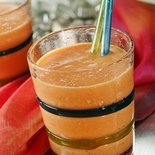A salmonella outbreak that sickened thousands and led to the recall of 500 million eggs produced under filthy conditions by two Iowa farms led Elizabeth Weise of USA Today to report on an Illinois farm that produces .jpg) over 800,000 eggs per day yet has never found a salmonella-positive test result.
over 800,000 eggs per day yet has never found a salmonella-positive test result.
This morning, N.Y. Times reporter William Neuman examines the conditions at Hi-Grade Egg Farm in Indiana and finds that safe eggs can be produced on a large scale.
“(The) droppings from 381,000 chickens are carried off along a zig-zagging system of stacked conveyor belts with powerful fans blowing across them.
"The excrement takes three days to travel more than a mile back and forth, and when it is finally deposited on a gray, 20-foot high mountain of manure, it has been thoroughly dried out, making it of little interest to the flies and rodents that can spread diseases like salmonella poisoning.
“Standing by the manure pile on a recent afternoon, Robert L. Krouse, the president of Midwest Poultry Services, the company that owns the Hi-Grade farm, took a deep breath. The droppings, he declared, smelled sweet, like chocolate"
Mr. Krouse, who is also chairman of the United Egg Producers, an industry association, said
“We’ve had to completely change the way we look at things. Thirty years ago, farms had flies and farms had mice, everything was exposed to everything else. They just all happily lived together. You can’t work that way anymore"
Today the hens on Mr. Krouse’s farms come from hatcheries certified to provide chicks free of salmonella. The young birds are vaccinated to create resistance to the bacteria. And then steps are taken to keep them .jpg) from being exposed to it, primarily by controlling mice and flies that may carry salmonella or spread it around.
from being exposed to it, primarily by controlling mice and flies that may carry salmonella or spread it around.
Big ag doesn’t mean bad ag. Organic or conventional, local or global, big or small, there are good farmers and bad farmers. The good ones know all about food safety and continuously work to minimize levels of risk.
Unfortunately, consumers have no way of knowing which eggs or foods were produced by microbiologically prudent farmers and which were produced on dumps. Market microbial food safety at retail so consumers can actually use their buying power and choose safer food.
 In a statement posted on its website on July 12, the firm further guaranteed that they have met all the needed food safety requirements in the countries where they exported their products.
In a statement posted on its website on July 12, the firm further guaranteed that they have met all the needed food safety requirements in the countries where they exported their products.
.jpg) contaminated leaves will spread bacteria to thousands of other leaves during washing and packaging.
contaminated leaves will spread bacteria to thousands of other leaves during washing and packaging.  sprouts by
sprouts by .jpg) over 800,000 eggs per day yet has never found a salmonella-positive test result.
over 800,000 eggs per day yet has never found a salmonella-positive test result..jpg) from being exposed to it, primarily by controlling mice and flies that may carry salmonella or spread it around.
from being exposed to it, primarily by controlling mice and flies that may carry salmonella or spread it around.  It is entirely possible to grow food, and clean it and cook it all by yourself – and completely mess things up and make people barf.
It is entirely possible to grow food, and clean it and cook it all by yourself – and completely mess things up and make people barf..jpg) manual labor and love.
manual labor and love.